J OURNEY TO M INDFULNESS
Journey to Mindfulness
THE AUTOBIOGRAPHY OF
Bhante G.
by
Bhante Henepola Gunaratana
with
Jeanne Malmgren

W ISDOM P UBLICATIONS B OSTON
Wisdom Publications
199 Elm Street
Somerville MA 02144 USA
www.wisdompubs.org
2003 Bhante Henepola Gunaratana
All rights reserved.
No part of this book may be reproduced in any form or by any means, electronic or mechanical, including photography, recording, or by any information storage and retrieval system or technologies now known or later developed, without permission in writing from the publisher.
Library of Congress Cataloging-in-Publication Data
Gunaratana, Henepola, 1927
Journey to mindfulness : the autobiography of Bhante Gunaratana / by Bhante Henepola Gunaratana with Jeanne Malmgren.
p. cm.
ISBN 0-86171-347-8 (pbk. : alk. paper)
1. Gunaratana, Henepola, 1927 2. Buddhist monksSri LankaBiography. 3. Spiritual lifeBuddhism. 4. Spiritual biographyUnited States. I. Malmgren, Jeanne. II. Title.
BQ960.U767A3 2003
294.391092dc22
2003015630
ISBN 9780861713479
eBook ISBN 9780861718332
15 14 13 12 11
5 4 3
Wisdom Publications books are printed on acid-free paper and meet the guidelines for permanence and durability of the Committee on Production Guidelines for Book Longevity of the Council on Library Resources.
Cover designed by Rick Snizik
Interior designed by Gopa & Ted2. Set in Minion 11/15.
Photo by  ; courtesy of Bhavana Society.
; courtesy of Bhavana Society.
 This book was produced with environmental mindfulness. We have elected to print this title on 30% PCW recycled paper. As a result, we have saved the following resources: 11 trees, 5 million BTUs of energy, 1,137 lbs. of greenhouse gases, 5,127 gallons of water, and 325 lbs. of solid waste. For more information, please visit our website, www.wisdompubs.org. This paper is also FSC certified. For more information, please visit www.fscus.org.
This book was produced with environmental mindfulness. We have elected to print this title on 30% PCW recycled paper. As a result, we have saved the following resources: 11 trees, 5 million BTUs of energy, 1,137 lbs. of greenhouse gases, 5,127 gallons of water, and 325 lbs. of solid waste. For more information, please visit our website, www.wisdompubs.org. This paper is also FSC certified. For more information, please visit www.fscus.org.
Contents
 W RITING AN AUTOBIOGRAPHY might seem like an inappropriate exercise for a bhikkhu, a Buddhist monk, since we bhikkhus strive to eradicate the ego, not glorify it. Through meditation and mindfulness we want to let go of attachments and practice selflessness. Why then would I write a whole book about me?
W RITING AN AUTOBIOGRAPHY might seem like an inappropriate exercise for a bhikkhu, a Buddhist monk, since we bhikkhus strive to eradicate the ego, not glorify it. Through meditation and mindfulness we want to let go of attachments and practice selflessness. Why then would I write a whole book about me?
The idea, oddly enough, came from my meditation retreats.
Whenever I teach a retreat, I invite attendees to write questions on slips of paper and put them in a box. Each evening, after my formal Dhamma talk, a lecture about the essence of the Buddhas teachings, I pull a few of the slips out of the box, one by one, and answer whatever question is there.
Usually people want to know about meditation: how to keep up the momentum theyve built at the retreat; what to do when they are so agitated they cant sit still; how to practice if they dont have a good teacher nearby. Sometimes, though, someone asks a question about my life:
How long have you been a monk?
What was it like, growing up in Sri Lanka?
How do you maintain monastic discipline in this world full of temptations?
When I answer those kinds of questions, I tend to ramble. I tell stories about my life and people seem to enjoy them. The meditation hall, usually a silent place, fills with laughter. Often the students say, Bhante, you should write your autobiography!
Ive read a few life stories of spiritual men and women, and in them, it always seems like miraculous, wondrous things happen to the main character. Sometimes, the main character may even be the one performing miracles.
Reading these amazing stories, one might conclude that spiritual people are somehow very different from regular people. As for me, I can claim no miracles. I have been a simple person all my life. Early on I learned that if I worked hard, I would usually get good resultsnothing supernatural about that. In many ways my life is probably much like yours.
And so I was hesitant to write the book my students were suggesting. I worried that it would appear to be an exercise in ego. I was afraid people might think I had grown vain and self-absorbed in my old age.
Not necessarily, a friend told me. You might be able to do some teaching by telling your own story. I thought about that. I thought about my life and realized that, yes, this might indeed be an opportunity to show how the Buddhas teachings can be an extraordinary guide, leading a simple person like myself to a life of great happiness, great fulfillment.
As a monk, I have dedicated my life to protecting and maintaining the Buddhas teachings. I have found that because of that, the Dhamma has protected and maintained me as well. Thats what I have learned in my seventy-five years. And thats the essence of what I want to share with you in all these rambling stories about my life.
For example, I can say sincerely that whenever I was arrogant in my life, I suffered a great deal. As a young man in monks college, I spied on other students, I gossiped, I was always looking for others faults. And because of that, I was miserable.
In fact, Id say that has always been my greatest weakness: finding fault in others. Rising above that defilement even a little bit took many long years, through much trial and error, and even now I occasionally struggle with it. But more or less, Im happy to say, I can now pretty much accept people as they are. And my life (not to mention theirs!) is so much smoother as a result.
By relying on the Buddhas teachings, I have learned slowly to withdraw from conflict rather than charging into it or, worse still, going looking for it. That, too, has made life immeasurably more peaceful.
With the help of the Buddhas teachings and the practice of mindfulness, the greatest change I have made in myself, I think, is that I can easily forgive people now, no matter what they do, and believe me, this skill didnt come easily! I had to work long and hard at it. But my own anger, contentiousness, and judgmentalness were fertile ground for practice. Just because a person becomes a monk, by no means is he immediately free from all defilements of character or empty of worldly concerns. As you will see over and over in this book, even in the supposedly noble world of spiritual work I encounteredin myself and in otherspetty jealousies, backstabbing, indifference, and cruelty.
When I reminisce now, I can see that all those things that seemed so awful at the time have ultimately led to positive outcomes. All the people and situations that I thought were painful were also teachers pushing me in the direction I was supposed to go, pointing out what I needed to learn to become happy.
In retrospect, I am grateful for the mysterious chain of causes and effects that unfolded in my life, even though many of them felt awful and unlucky at the time. If my father had not been such a strict disciplinarian, I might not have left home to become a monk. If my teachers hadnt punished me so severely, I wouldnt have gone off to missionary school. If I hadnt lost my memory and needed a cure, I might never have taken an interest in meditation. If I hadnt fallen sick working with the Untouchables of India, I wouldnt have left to go to Malaysia. If my visa had been extended in Malaysia, I probably would never have ventured to America. And if things hadnt fallen apart so bitterly at the Washington Buddhist Vihara, I might not have started Bhavana Society. But this has been my life, and I am grateful for all of it.
Next page

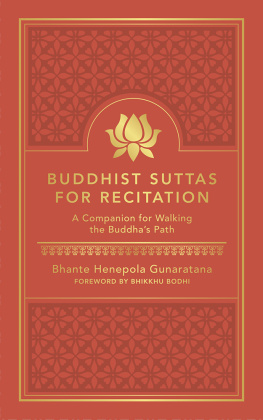
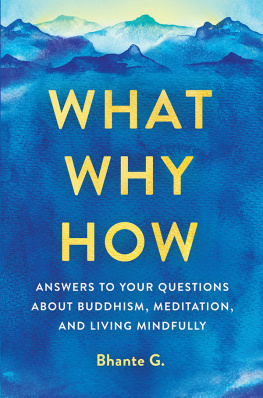
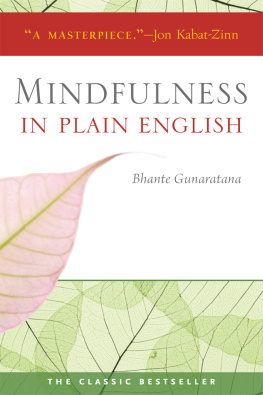
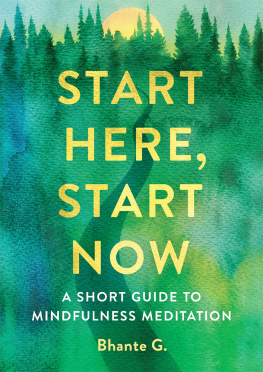
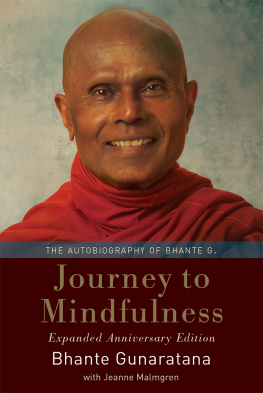
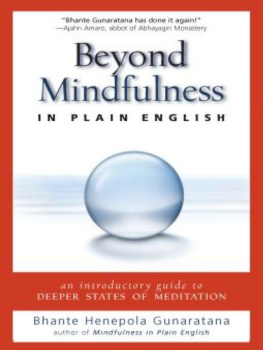
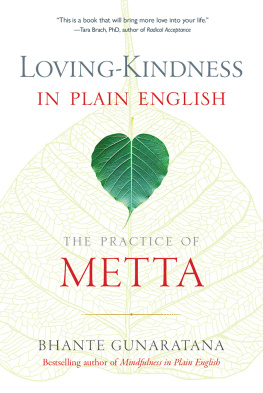
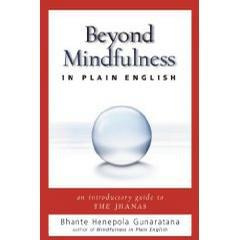
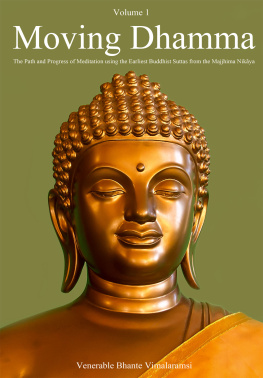
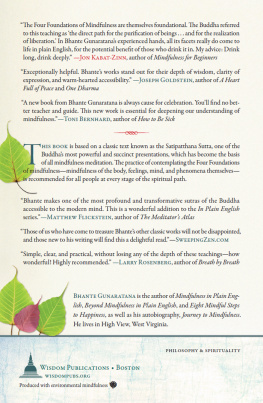

 ; courtesy of Bhavana Society.
; courtesy of Bhavana Society. This book was produced with environmental mindfulness. We have elected to print this title on 30% PCW recycled paper. As a result, we have saved the following resources: 11 trees, 5 million BTUs of energy, 1,137 lbs. of greenhouse gases, 5,127 gallons of water, and 325 lbs. of solid waste. For more information, please visit our website, www.wisdompubs.org. This paper is also FSC certified. For more information, please visit www.fscus.org.
This book was produced with environmental mindfulness. We have elected to print this title on 30% PCW recycled paper. As a result, we have saved the following resources: 11 trees, 5 million BTUs of energy, 1,137 lbs. of greenhouse gases, 5,127 gallons of water, and 325 lbs. of solid waste. For more information, please visit our website, www.wisdompubs.org. This paper is also FSC certified. For more information, please visit www.fscus.org. W RITING AN AUTOBIOGRAPHY might seem like an inappropriate exercise for a bhikkhu, a Buddhist monk, since we bhikkhus strive to eradicate the ego, not glorify it. Through meditation and mindfulness we want to let go of attachments and practice selflessness. Why then would I write a whole book about me?
W RITING AN AUTOBIOGRAPHY might seem like an inappropriate exercise for a bhikkhu, a Buddhist monk, since we bhikkhus strive to eradicate the ego, not glorify it. Through meditation and mindfulness we want to let go of attachments and practice selflessness. Why then would I write a whole book about me?